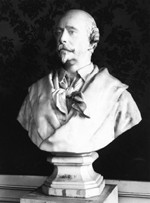Charles Auguste de Morny (Charles Auguste Louis Joseph, duc de Morny), was born in Saint-Maurice-en-Valais, on 17 September 1811. Morny's birth certificate registers his father as Auguste Demorny, a planter in the French Caribbean colony of Saint-Domingue but, in fact, he was the illegitimate son of Hortense Bonaparte and Charles, comte de Flahaut. Morny boasted illustrious connections: he was half-brother to Louis-Napoleon on his maternal side, and his father was himself the issue of Talleyrand's affair with the countess Adélaïde de Flahaut. Initiated into salon life at his father's side, Morny became a sous-lieutenant in the French army in 1830. He fought in the Algerian campaigns, for which he received the Légion d'honneur. In May 1838, he left the army to pursue a business career with the capital of his mistress Fanny le Hon. Fanny was the daughter of the banker François-Dominique Mosselman and wife of the comte Charles le Hon, a Belgian diplomat. The liaison would prove vital for Morny's career.
Morny's first acquisition, a sugar refinery, was a success, and he also became the administrator of the Vieille-Montagne mines owned by Mosselman. At the same time, his political star was in the ascendant; he was elected conseiller général (member of the departmental assembly) in 1839, and was successfully elected member of parliament against a conservative candidate on the strength of his business dealings. His love of order made him into a natural supporter of the Guizot government, but he was by no means a traditionalist, contributing secretly to Véron's opposition newspaper, Le Constitutionnel. The revolution of 1848 deprived him of his seat in parliament and left his financial affairs in disorder. Penniless, he turned for political refuge towards his half-brother Louis-Napoleon and regained a place in parliament in 1849. Meanwhile, his business affairs were resuscitated yet again by Mosselman, who lent him a massive 3.5 million francs.
Initially, Morny was unimpressed by Louis-Napoleon and his entourage, but he knew that the president's support would be critical for his private affairs. He was therefore instrumental in the coup d'état that ensured Louis-Napoleon's return to power, managing to take over the ministry of the interior, placate parliamentary conservatives and also brutally suppress the populace – all with Fanny's financial aid. As interior minister, Morny put in place the authoritarian measures that would underpin the Second Empire. For instance, potentially dangerous members of parliament were expelled between 1851 and 1852. Under the guise of supporting universal suffrage in the elections of February 1852, he asked prefects to carry out their appointments using a meritocratic system, giving preference to men closer to the latest economic developments.
For the next five years, Morny was active developing railway lines, manoeuvring between traditional finance (such as the Rothschilds and Talabots) and the newer money of the Pereire brothers, and controlling the French mining and sugar industries. Meanwhile, his escapades with a new mistress, Annie Hutton, piqued Fanny Le Hon, who moved closer to the powerful minister Rouher.
Quick to establish himself as an indispensable figure of the Second Empire, he became a member of parliament for the Puy de Dôme region from February 1852, and president of the Corps législatif (legislative assembly) in 1854. In 1855, Louis-Napoleon, by now Napoleon III, sent Morny as ambassador to the coronation of Alexander II in Russia. The outcome of the embassy was more favourable for Morny's business and marital contracts than any Franco-Russian alliance. On 19 January 1857, he married the princess Sophie Troubetskoï, which enraged Fanny le Hon and led her to demand financial compensation, of which a substantial part was paid by the state. Many of Morny's next projects – including those regarding Grand Central railway lines and plans for a bank – did not come to fruition, blocked by an increasingly hostile Rouher and the conseil d'État. Not to be discouraged, he founded the hippodrome of Longchamps and the holiday town of Deauville. From 1860, Morny was engaged in liberalisation of the Second Empire; his efforts in this area in particular won him a dukedom in 1862. Despite scandals during the Mexican campaigns and involving the Suez Canal Company, Morny retained his prestige and was given a state funeral when he died on 10 March 1865 of sickness, perhaps severe bronchitis. He is buried in a tomb designed by Viollet-le-Duc at the Père-Lachaise cemetery in Paris.
Based on Miquel, Pierre in Dictionnaire du Second Empire (Fayard 1995)
SR, March 2015


